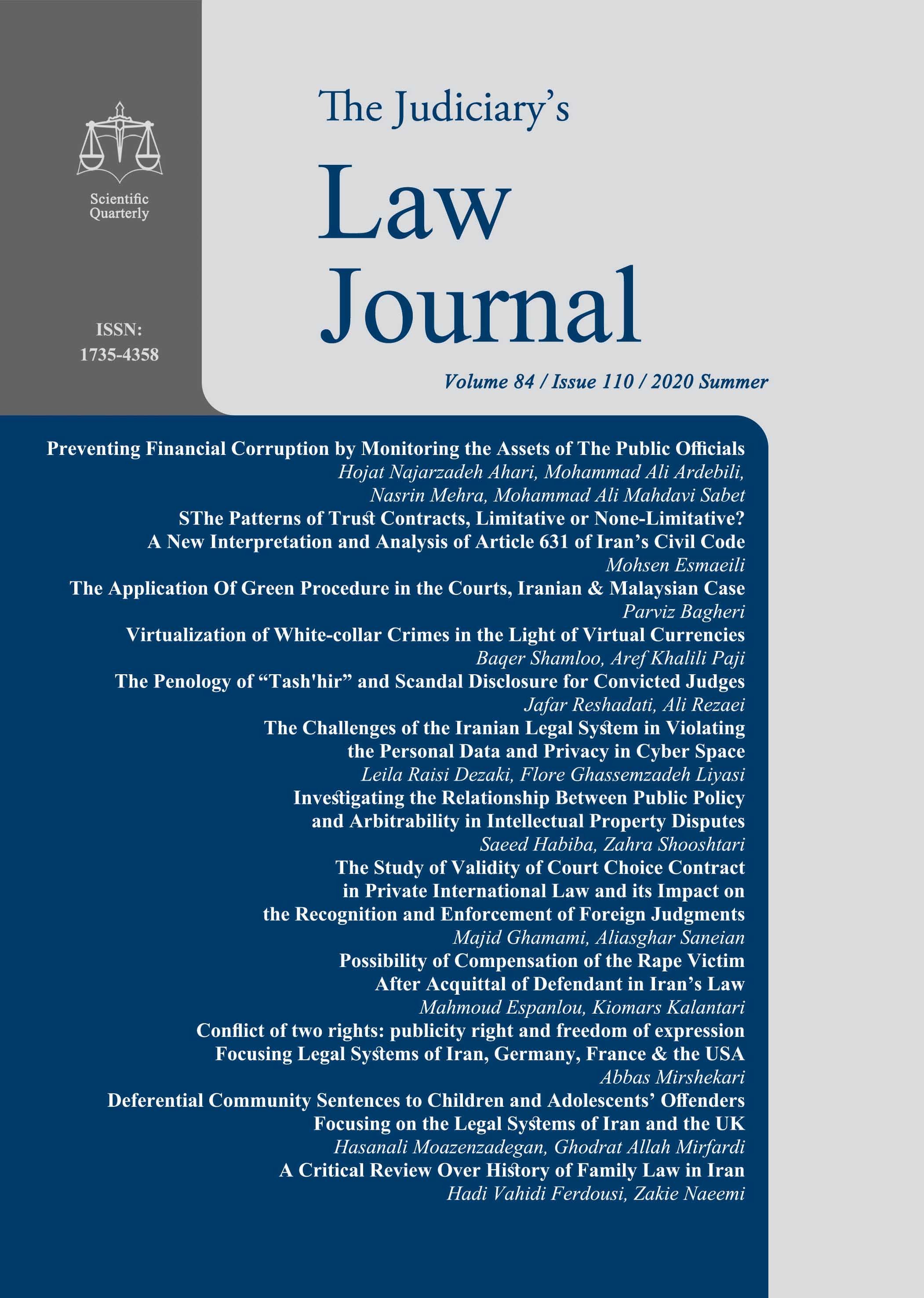Document Type : Research/Original/Regular Article
Authors
1 PhD Student in Criminal Law and Criminology, Faculty of Law, Theology and Political Science, Islamic Azad University. Science and Research Branch, Tehran, Iran
2 Professor, Department of Criminal Law and Criminology, Faculty of Law, Shahid Beheshti University, Tehran, Iran
3 Associate Professor, Department of Criminal Law and Criminology, Faculty of Law, Shahid Beheshti University, Tehran, Iran
4 Assistant Professor, Department of Criminal Law and Criminology, Faculty of Law, Theology and Political Science, Islamic Azad University (Science and Research Branch), Tehran, Iran
Abstract
The exchange of public interest with private interests is a brief definition of “corruption”, and its existence indicates the misfunction of the public institutions. Corruption is an anti - value phenomenon and is disruptive to the rule of law, so that prevention of it is an undeniable necessity for governments. More than that the prevention of corruption directly relates to the legitimacy of each country’s political systems. Meanwhile monitoring the property of public officials is one of the tools of preventing and combating corruption in most countries. It is often impossible to detect and prosecute corruption offenses because of the hidden nature of these crimes. Yet the best solution for overcoming this problem is to focus on the property of the officials. In line with global developments and the desire to keep up with the means of fighting with corruption, laws have been passed in Iran to stand against corruption. The law of property monitoring of authorities, officials and agents of the Islamic Republic of Iran approved by The Nation’s Exigency Council in1394 is one of the results.
The adoption of the Act itself is a step forward, but its effectiveness and usefulness must be measured in practice. From the surveying that have been carried out, it becomes apparent that the defects in the above law are noticed, including the fact that the mechanism for checking the property during the service has not been conceived, as the important discussion of the conflict of interest has not been mentioned and the law has not been sufficiently sanctioned. In short, the accepted standards of developed countries in combating against corruption are not included in the Iranian Law, and the need to resolve and correct the weaknesses of the law is strongly felt.
Keywords
Main Subjects
فارسی
- اخوان کاظمی، بهرام (1383)، «نظارت بیرونی در نظامهای سیاسی»، مجلۀ حکومت اسلامی، شماره 33.
- باقری، فاطمه (1391)، «نظارت بر اموال و دارائی مقامات و مسئولین دولتی»، مجلۀ کارآگاه، شماره 20.
- جعفری لنگرودی، محمد جعفر، 1382، ترمینولوژی حقوق، تهران: انتشارات گنج دانش.
- دادخدائی، لیلا (1390)، فساد مالی اداری و سیاست جنائی مقابله با آن، تهران: انتشارات میزان.
- ذاکر صالحی، غلامرضا (1388)، راهبردهای مبارزه با فساد اداری، تهران: انتشارات جنگل.
- رودگر کوهپر، عطااله و رضوی فرد بهزاد (1398)، «تسهیم اموال؛ راهبرد نوین همکاری کشورها در زمینه استرداد اموال و عواید ناشی از جرم»، مجلۀ حقوقی دادگستری، شماره 106.
- زارع قاجاری، فردوس، قائم مقامی، علی (1392)، استانداردهای بینالمللی مبارزه با پولشوئی و تامین مالی تروریسم (توصیههای چهل گانه گروه ویژۀ اقدام مالی FATF)، تهران: انتشارات تاش.
- سازمان همکاریهای اقتصادی و توسعه (OECD) (1395)، اظهار دارائی مقامات دولتی ابزاری برای پیشگیری از فساد (اروپای شرقی و آسیای مرکزی)،مترجم: غلامحسین همایونی، تهران: نشر علوم اجتماعی.
- شیروی، عبدالحسین و وکیلی مقدم، محمدحسین (1393)، «ضمانتاجرای فرا قانونی و جایگاه آن در حقوق نرم»، فصلنامۀ دانش حقوق اقتصادی، شماره 5.
- عابد جعفری، حسن، زرندی، سعید (1388)، «طراحی سیستم به منظور اطمینان از صحت اموال اعلام شده توسط مسئولان»، فصلنامۀ راهبرد، شماره 53.
- فرهمندفر، حیدر (۱۳۸۸)، «الزامات قانونگذار ایران پس از الحاق به کنوانسیون سازمان ملل متحد برای مبارزه با فساد»، مجلۀ کارآگاه، شماره 7.
- محسنی، فرید (1392)، «پیشگیری از فساد اداری با تاکید بر فناوری اطلاعات»، مجلۀ دیدگاههای حقوق قضائی، شماره 61.
- مرکز پژوهشهای مجلس شورای اسلامی (1390)، اعلامیه دارایی یا منافع شخصی، ترجمۀ حسن وکیلیان، شماره مسلسل 10777.
- میدری، احمد (1385)، «مقدمهای بر نظریۀ حکمرانی خوب»، فصلنامۀ رفاه اجتماعی، شماره 22.
- نجارزاده اهری، حجت (1389)، سیاست جنایی ناظر به تحصیل مال از طریق نامشروع در حقوق ایران و کنونسیوان مبارزه با فساد، استاد راهنما: سید منصور میر سعیدی، دانشگاه علامه طباطبائی تهران.
- نجارزاده اهری، حجت، میرسعیدی، سیدمنصور (1391)، «دارا شدن من غیر حق در حقوق ایران در پرتو آموزههای کنوانسیون سازمان ملل برای مبارزه با فساد»، مجلۀ پژوهشهای حقوقی، شماره 21.
- نیک پور، امین (1395)، «ارائه الگوی نظارت عمومی به منظور پیشگیری از بروز فساد اداری در سازمانهای دولتی ایران»، فصلنامۀ مجلس و راهبرد، سال بیست و سوم، شمارۀ 87.
- وکیلیان، حسن، درخشان، داور (1396)، «بررسی کارائی قوانین افشای اموال در کاهش فساد اداری با رویکرد تطبیقی»، مجلۀ دیدگاههای حقوق قضائی، شمارۀ 77 و 78.
انگلیسی
- Booz Allen Hamilton, (2011) comparative evaluation of unexplained weaith orders, prepared for the US department of justice national institute of justice,
- Burdescu, R., Gary, R., Gilman, S., Trapnell, S. (2009), Income and Asset Declarations: Tools and Trade-offs, (Stolen Asset Recovery (StAR) Initiative) The World Bank Washington, D.C
- Djankov, S., R. La Porta, F. Lopez-de-Silanes, and A. Shleifer (2009) “Disclosure by Politicians.” Working Paper 14703, National Bureau of Economic Research, Cambridge, MA, February.
- Greenberg, T., L. Gray, D. Schantz, M. Latham, and C. Garder. (2010) “Politically Exposed Persons: A Policy Paper on Strengthening Preventive Measures for the Banking Sector.” World Bank, Washington, DC
- Ivana M. Rossi, Laura Pop, and Tammar Berger, (2017) Getting the Full Picture on Public Officials:A How-to Guide for Effective Financial Disclosure, are available for free at:
https://openknowledge.worldbank.org/handle/10986/2172
- Tytko, Anna, Stepanova, Hanna, (2019) INTERNATIONAL EXPERIENCE OF DECLARING PROPERTY, ASSETS AND PRIVATE INTERESTS, Baltic Journal of Economic Studies, Vol. 5, No. from:
www.fatfgafi.org/publications/fatfrecommendations/documents/fatfrecommendations.html.

